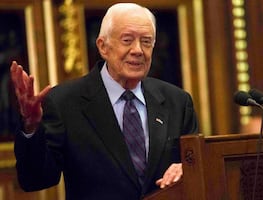Más Información

Científicos de la UNAM desarrollan lombricompostaje; una alternativa eficiente para el manejo de heces caninas

Anuncian cierre de oficinas de EU en México por funeral del expresidente Jimmy Carter; citas serán reprogramadas
Pope Francis spoke at Independence Hall, where the Declaration of Independence and the Constitution were signed. He stood at the very lectern Abraham Lincoln used to deliver the Gettysburg Address. And he stepped forward to the stirring strains of "Fanfare for the Common Man."
In a scene rich with historical symbolism, the Pope arrived in the City of Brotherly Love on Saturday, offering warm and affectionate words of welcome to immigrants and extolling America's founding ideals of liberty and equality.
"Those ringing words continue to inspire us today," the Pope said of the Declaration of Independence, "even as they have inspired peoples throughout the world to fight for the freedom to live in accordance with their dignity."
He cited the abolition of slavery, the growth of the labor movement and the fight for racial equality as proof that "when a country is determined to remain true to its founding principles, based on respect for human dignity, it is strengthened and renewed."
At the same time, Francis warned that religious freedom is under threat. But it was not the hard-hitting discussion some conservative American bishops may have wanted to hear.
Loath to get dragged into domestic culture wars, the Pope did not mention gay marriage, abortion or government-mandated birth control coverage by name, speaking of threats to religious liberty in broader, more global terms.
He decried "a world where various forms of modern tyranny seek to suppress religious freedom, or try to reduce it to a subculture without right to a voice in the public square, or to use religion as a pretext for hatred and brutality."
Using the occasion instead to embrace other causes close to his heart, Francis encouraged immigrants in the crowd of 40,000 to celebrate their heritage and traditions, and he assured them they are of value to America.
"By contributing your gifts, you will not only find your place here, you will help to renew society from within," the first Pope from Latin-America said in his native Spanish.
On Saturday night, tens of thousands gathered on the wide Benjamin Franklin Parkway for a music-and-prayer festival featuring Aretha Franklin, Italian tenor Andrea Bocelli, actor Mark Wahlberg and comedian Jim Gaffigan. Francis was cheered by crowds on the sidewalks as he made his way to the site in his popemobile.
Francis came to Philadelphia to close out the World Meeting of Families, a Vatican-sponsored conference of more than 18,000 people from around the world. He found a city practically under lockdown, with blocked-off streets and checkpoints manned by police, National Guardsmen and border agents.
There had been fears that visitors might be scared away by the security, and, in fact, train ridership was lower than expected, some streets were eerily quiet, and a vendor of Pope sunglasses cut his price from $15 to $10 for lack of business.
It remains to be seen if the expected 1 million people turn out for Francis' final Mass in the U.S., on the Parkway on Sunday.
Earlier in the day Saturday, the pontiff arrived from New York at the Philadelphia airport, where a Catholic high school band launched into the theme song from the Philadelphia-set movie "Rocky." Among those greeting him was Richard Bowes, a former Philadelphia police officer wounded in the line of duty. Francis also kissed the forehead of a 10-year-old boy severely disabled with cerebral palsy.
Then Francis celebrated a Mass for about 1,600 people at the Cathedral Basilica of Sts. Peter and Paul, saying in his homily that the future of the Catholic Church in the U.S. requires a much more active role for lay Catholics, especially women.
"It means valuing the immense contribution which women, lay and religious, have made and continue to make to the life of our communities," he said.








